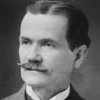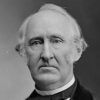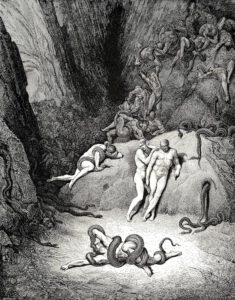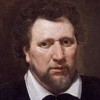The pack of this world was a kind of pleasant weight upon me, as happens in sleep, and the thoughts in which I meditated on you were like the efforts of someone who tries to get up but is so overcome with drowsiness that he sinks back again into sleep. Of course no one wants to sleep forever, and everyone in his senses would agree that it is better to be awake; yet all the same, when we feel a sort of lethargy in our limbs, we often put off the moment of shaking off sleep, and, even though it is time to get up, we gladly take a little longer in bed, conscious though we may be that we should not be doing so. In just the same way I was quite certain that it was better to give myself up to your charity rather than to give in to my own desires; but, though the former course was a conviction to which I gave my assent, the latter was a pleasure to which I gave my consent.
[Ita sarcina saeculi, velut somno adsolet, dulciter premebar, et cogitationes quibus meditabar in te similes erant conatibus expergisci volentium, qui tamen superati soporis altitudine remerguntur. Et sicut nemo est qui dormire semper velit omniumque sano iudicio vigilare praestat, differt tamen plerumque homo somnum excutere cum gravis torpor in membris est, eumque iam displicentem carpit libentius quamvis surgendi tempus advenerit: ita certum habebam esse melius tuae caritati me dedere quam meae cupiditati cedere, sed illud placebat et vincebat, hoc libebat et vinciebat.]
Augustine of Hippo (354-430) Christian church father, philosopher, saint [b. Aurelius Augustinus]
Confessions, Book 8, ch. 5 / ¶ 12 (8.4.12) (c. AD 398) [tr. Warner (1963)]
(Source)
(Source (Latin)). Alternate translations:
Thus with the baggage of this present world was I held down pleasantly, as in sleep: and the thoughts wherein I meditated on Thee were like the efforts of such as would awake, who yet overcome with a heavy drowsiness, are again drenched therein. And as no one would sleep for ever, and in all men's sober judgment waking is better, yet a man for the most part, feeling a heavy lethargy in all his limbs, defers to shake off sleep, and though half displeased, yet, even after it is time to rise, with pleasure yields to it, so was I assured that much better were it for me to give myself up to Thy charity, than to give myself over to mine own cupidity; but though the former course satisfied me and gained the mastery, the latter pleased me and held me mastered.
[tr. Pusey (1838)]
Thus with the baggage of the world was I sweetly burdened, as when in slumber; and the thoughts wherein I meditated upon Thee were like unto the efforts of those desiring to awake, who, still overpowered with a heavy drowsiness, are again steeped therein. And as no one desires to sleep always, and in the sober judgment of all waking is better, yet does a man generally defer to shake off drowsiness, when there is a heavy lethargy in all his limbs, and, though displeased, yet even after it is time to rise with pleasure yields to it, so was I assured that it were much better for me to give up myself to Thy charity, than to yield myself to my own cupidity; but the former course satisfied and vanquished me, the latter pleased me and fettered me.
[tr. Pilkington (1876)]
Thus with the baggage of this world I was sweetly pressed down, as it happens in sleep ; and the thoughts by which I meditated on Thee were like the efforts of those who would awake, but who being overpowered by deep drowsiness, are again immersed therein. And as no one wishes to be always asleep, and in the sound judgment of all men waking is better; yet often does a man, when a heavy drowsiness is upon his limbs, defer to shake off sleep, and though not approving it, yet even when the time to rise has come, more willingly encourage it; so was I convinced that it was better for me to surrender myself to Thy Charity, than to yield myself up to my own lusts; but the former course approved itself and convinced me, the latter pleased me and held me bound.
[tr. Hutchings (1890)]
So the heavy burden of the world seemed delightful, as in a dream, and my musings on Thee were like the struggles of one who would awake, but falls back overcome by depths of slumber. And as no one wishes to sleep for ever, for all men rightly count waking better, and yet a man will not break his slumber when his limbs are heavy with drowsiness, and is glad to sleep on, though his reason disapproves and the hour for rising has struck, so I knew for certain that it was better to yield to Thy love than to my lust, but the love charmed and could not prevail, the lust pleased and bound me.
[tr. Bigg (1897), 8.5.2]
I was held down as agreeably by this world’s baggage as one often is by sleep; and indeed the thoughts with which I meditated upon You were like the efforts of a man who wants to get up but is so heavy with sleep that he simply sinks back into it again. There is no one who wants to be asleep always -- for every sound judgment holds that it is best to be awake -- yet a man often postpones the effort of shaking himself awake when he feels a sluggish heaviness in the limbs, and settles pleasurably into another doze though he knows he should not, because it is time to get up. Similarly I regarded it as settled that it would be better to give myself to Your love rather than go on yielding to my own lust; but the first course delighted and convinced my mind, the second delighted my body and held it in bondage.
[tr. Sheed (1943)]
Thus with the baggage of the world I was sweetly burdened, as one in slumber, and my musings on thee were like the efforts of those who desire to awake, but who are still overpowered with drowsiness and fall back into deep slumber. And as no one wishes to sleep forever (for all men rightly count waking better) -- yet a man will usually defer shaking off his drowsiness when there is a heavy lethargy in his limbs; and he is glad to sleep on even when his reason disapproves, and the hour for rising has struck -- so was I assured that it was much better for me to give myself up to thy love than to go on yielding myself to my own lust. Thy love satisfied and vanquished me; my lust pleased and fettered me.
[tr. Outler (1955)]
Thus by the burdens of this world I was sweetly weighed down, just as a man often is in sleep. Thoughts wherein I meditated upon you were like the efforts of those who want to arouse themselves but, still overcome by deep drowsiness, sink back again. Just as no man would want to sleep forever, and it is the sane judgment of all men that it is better to be awake, yet a man often defers to shake off sleep when a heavy languor pervades all his members, and although the time to get up has come, he yields to it with pleasure even although it now irks him. In like manner, I was sure that it was better for me to give myself up to your love than to give in to my own desires. However, although the one way appealed to me and was gaining mastery, the other still afforded me pleasure and kept me victim.
[tr. Ryan (1960)]
In fact I bore the burden of the world as contentedly as one sometimes bears a heavy load of sleep. My thoughts, as I meditated upon you, were like the efforts of a man who tries to wake but cannot and sinks back into the depths of slumber. No one wants to sleep forever, for everyone rightly agrees that it is better to be awake. Yet a man often staves off the effort to rouse himself when his body is leaden with inertia. He is glad to settle down once more, although it is against his better judgement and it is already time he were up and about. In the same way I was quite sure that it was better for me to give myself up to your love than to surrender to my own lust. But while I wanted to follow the first course and was convinced that it was right, I was still a slave to the pleasures of the second.
[tr. Pine-Coffin (1961)]
So, as happens in a drowsiness, was I pleasantly loaded with the baggage of this world, and the thoughts I had in mind of you were like the struggles of those who want to wake up, but overcome by deep sleep are drowned in it again. And just as there is no one who wants to go on sleeping for ever (for in any sane man’s judgment it is better to stay awake), still a man does often postpone shaking off sleep, when he feels a heavy lethargy through all his limbs, and in spite of himself is prone to doze again, when often it is time to rise, in just such a fashion, I was certain that it was better to surrender to your love than to give in to my desire. The former course pleased and convinced me; the latter seduced me and held me prisoner.
[tr. Blaiklock (1983)]
I was thus weighed down by the pleasant burden of the world in the way one commonly is by sleep, and the thoughts with which I attempted to meditate upon you were like the efforts of people who are trying to wake up, but are overpowered and immersed once more in slumberous deeps. No one wants to be asleep all the time, and it is generally agreed among sensible people that being awake is a better state, yet it often happens that a person puts off the moment when he must shake himself out of sleep because his limbs are heavy with a lassitude that pulls him toward the more attractive alternative, even though he is already trying to resist it and the hour for rising has come; in a similar way I was quite sure that surrendering myself to your love would be better than succumbing to my lust, but while the former course commended itself and was beginning to conquer, the latter charmed and chained me.
[tr. Boulding (1997)]
One night the wine was singing in the bottles:
“Mankind, dear waif, I send to you, in spite
Of prisoning glass and rosy wax that throttles,
A song that’s full of brotherhood and light.”[Un soir, l’âme du vin chantait dans les bouteilles:
«Homme, vers toi je pousse, ô cher déshérité,
Sous ma prison de verre et mes cires vermeilles,
Un chant plein de lumière et de fraternité!»]Charles Baudelaire (1821-1867) French poet, essayist, art critic
Les Fleurs du Mal [The Flowers of Evil], # 93 “L’Âme du vin [The Soul of Wine],” st. 1 (1857) [tr. Campbell (1952)]
(Source)
Also in the 1861 ed. (#104) and the 1868 ed. (#128). (Source (French)). Alternate translations:
One eve in the bottle sang the soul of wine:
"Man, unto thee, dear disinherited,
I sing a song of love and light divine --
Prisoned in glass beneath my seals of red."
[tr. Sturm (1905)]
One night, the soul of wine was singing in the flask:
"O man, dear disinherited! to you I sing
This song full of light and of brotherhood
From my prison of glass with its scarlet wax seals."
[tr. Aggeler (1954)]
[The Soul of Wine]
sang by night in its bottles: "Dear mankind,
dear and disinherited! Break the seal
of scarlet wax that darkens my glass jail,
and I shall bring you light and brotherhood!"
[tr. Howard (1982)]
One evening the wine's soul sang in the bottles, "Man, dear disinherited Man, from my glass prison with its scarlet seals of wax I send you a song which is full of light and brotherhood."
[tr. Scarfe (1986)]
One night, from bottles, sang the soul of wine:
"O misfit man, I send you for your good
Out of the glass and wax where I'm confined,
A melody of light and brotherhood!"
[tr. McGowan (1993)]
The past is never dead. It’s not even past.
William Faulkner (1897-1962) American novelist
Requiem for a Nun, Act 1, sc. 3 [Stevens] (1951)
(Source)
Sometimes misquoted as "The past isn't over. It isn't even past."
“Is it true that your life passes before your eyes before you die?”
YES.
“Ghastly thought, really.” Rincewind shuddered. “Oh, gods, I’ve just had another one. Suppose I am about to die and this is my whole life passing in front of my eyes?”
I THINK PERHAPS YOU DO NOT UNDERSTAND. PEOPLE’S WHOLE LIVES DO PASS IN FRONT OF THEIR EYES BEFORE THEY DIE. THE PROCESS IS CALLED “LIVING.”
Terry Pratchett (1948-2015) English author
The Last Continent [Death and Rincewind] (1999)
(Source)
Often paraphrased as something like:
It is said that your life flashes before your eyes just before you die. That is true, it’s called Life.
Your few quatrains are not amiss,
Your couplets too are neat; for this
You earn a mild regard,
But little fame, for many men
Can write good verses now and then —
To make a book is hard.[Quod non insulse scribis tetrasticha quaedam,
Disticha quod belle pauca, Sabelle, facis,
Laudo, nec admiror. Facile est epigrammata belle
Scribere, sed librum scribere difficile est.]Martial (AD c.39-c.103) Spanish Roman poet, satirist, epigrammatist [Marcus Valerius Martialis]
Epigrams [Epigrammata], Book 7, epigram 85 (7.85) (AD 92) [tr. Pott & Wright (1921)]
(Source)
"To Sabellus." (Source (Latin)). Alternate translations:
Cause thou dost pen Tetrasticks clean and sweet
And some few pretty disticks with smooth feet,
I praise but not admire:
Tis easy to acquire
Short modest Epigrams that pretty look,
But it is hard and tough to write a book.
[tr. Fletcher (1656)]
That some tetrasticks not amiss you write,
Or some few disticks prettyly indite,
I like, but not admire. With small paynes tooke
An epigram is writ; but not a booke.
[tr. Killigrew (1695)]
Some not absurd tetrastichs thou may'st squeeze;
And distichs, that can scarce deny to please.
I praise, yet not admire: a verse to cook
Is no hard task; but canst thou write a book?
[tr. Elphinston (1782), Book 3, ep. 54]
For sometimes writing quatrains which are not devoid of humour, Sabellus, and for composing a few distichs prettily, I commend you; but I am not astonished at you. It is easy to write a few epigrams prettily; but to write a book of them is difficult.
[tr. Bohn's Classical (1859)]
Your writing, not without wit, certain quatrains, your composing nicely a few distichs, Sabellus, I applaud, yet am not surprised. 'Tis easy to write epigrams nicely, but to write a book is hard.
[tr. Ker (1919)]
The fact that you can write with taste
A quatrain now and then
And even several couplets too
Is something I do commend,
But I'm not amazed, for after all
A few epigrams smart and neat
Are easy to write, but a bookful of them
Is quite another feat!
[tr. Marcellino (1968)]
That you write some quatrains not without wit and turn a few couplets prettily, Sabellus, is something I praise but do not wonder at. It's easy to write epigrams prettily, but to write a book is hard.
[tr. Shackleton Bailey (1993)]
A quatrain here, a couplet there,
Some decent rhymes, but let's be fair:
Your output no great author shook;
It takes much more to fill a book.
[tr. Ericsson (1995)]
You wrote some clever couplets?
"Take a look."
These epigrams are fine --
but not a book.
[tr. Wills (2007)]
Sabellus, that you write some witty quatrains
and craft some couplets well earns my regard,
but no surprise. To write good epigrams
is easy, but to write a book is hard.
[tr. McLean (2014)]
You know growing old is like being increasingly penalized for a crime you haven’t committed.
Not sweet son, nor revered old father, nor
The long-due love which was to have made glad
Penelope for all the pain she bore,
Could conquer the inward hunger that I had
To master earth’s experience, and to attain
Knowledge of man’s mind, both the good and bad.[Né dolcezza di figlio, né la pieta
del vecchio padre, né ‘l debito amore
lo qual dovea Penelopé far lieta,
vincer potero dentro a me l’ardore
ch’i’ ebbi a divenir del mondo esperto,
e de li vizi umani e del valore.]Dante Alighieri (1265-1321) Italian poet
The Divine Comedy [Divina Commedia], Book 1 “Inferno,” Canto 26, l. 94ff (26.94-99) [Ulysses] (1309) [tr. Binyon (1943)]
(Source)
Ulysses, explaining why he chose to continue exploring over filial piety, leading to his eventual death.
(Source (Italian)). Alternate translations:
Not the sweet fondness for a Son, nor yet
The pious duty for an ancient Sire,
Nor all the love I ow'd Penelope,
That ardor could subdue which me possest,
In distant climes experience to learn,
And human Vices as well as Virtues know.
[tr. Rogers (1782), l. 90ff]
Yet, after all my toils, nor aged sire,
Nor son, nor spouse, could check the wild desire
Again to tempt the feat, with vent'rous oar.
In search of same I measur'd various climes,
Still vers'd in deeper frauds and nameless crimes,
With slender band, and solitary sail.
[tr. Boyd (1802), st. 16-17]
Nor fondness for my son, nor reverence
Of my old father, nor return of love,
That should have crown’d Penelope with joy,
Could overcome in me the zeal I had
T’ explore the world, and search the ways of life,
Man’s evil and his virtue.
[tr. Cary (1814)]
That name; nor sweet remembrance of my boy,
Nor old Laertes' grief, nor debt of love,
Which owed Penelope the arrear of joy,
Could quench my burning zeal, that inly strove,
And bade the wisdom of the world explore.
And human vices, human worth to prove.
[tr. Dayman (1843)]
Neither fondness for my son, nor reverence for my aged father, nor the due love that should have cheered Penelope,
could conquer in me the ardour that I had to gain experience of the world, and of human vice and worth.
[tr. Carlyle (1849)]
Nor sweetness of my son, nor piety
For aged father, nor arrear of love
To glad Penelope, my mind could move,
Could conquer yet the ardour in my breast
In the worldly wisdom to become expert --
In every virtue, and in every art.
[tr. Bannerman (1850)]
My son's sweet ways, the sacred duty claim'd
By my old father, nor that debt of love
Due to Penelope, her source of joy,
Could conquer in my soul the burning thirst
To see and know the deep things of the world,
To study human worth and human vice.
[tr. Johnston (1867)]
Nor fondness for my son, nor reverence
For my old father, nor the due affection
Which joyous should have made Penelope,
Could overcome within me the desire
I had to be experienced of the world,
And of the vice and virtue of mankind.
[tr. Longfellow (1867)]
Neither the sweetness of my son, nor my affection for my old father, nor the due love which ought to have made Penelope happy, could conquer within me the ardour which I had to become experienced in the world, and in the vices of men and in their goodness.
[tr. Butler (1885)]
Not my son's sweetness, nor compassionate fear
For my old father, nor the lawful love
That should have cheered Penelope so dear.
Could from my mind the ardent wish remove
Of the wide world experience to attain,
And human vices and man's worth to prove.
[tr. Minchin (1885)]
Neither fondness for my son, nor piety for my old father, nor the due love that should have made Penelope glad, could overcome within me the ardor that I had to gain experience of the world, and of the vices of men, and of their valor.
[tr. Norton (1892)]
Neither affection for my boy, nor reverence for an aged sire, nor even the debt of love that should have filled Penelope with gladness, had power to quell within me the yearning I had nourished to win experience of the world, men's vices and their worth.
[tr. Sullivan (1893)]
Nor sweetness of my son, nor filial duty
To my old father, nor the love I owed her
That should have made Penelope still happy.
Could overcome within my breast the ardour
I had to win experience world-embracing,
As well of human vices as of virtue
[tr. Griffith (1908)]
Not fondness for a son, nor duty to an aged father, nor the love I owed Penelope which should have gladdened her, could conquer within me the passion I had to gain experience of the world and of the vices and the worth of men.
[tr. Sinclair (1939)]
No tenderness for my son, nor piety
To my old father, nor the wedded love
That should have comforted Penelope
Could conquer in me the restless itch to rove
And rummage through the world exploring it,
All human worth and wickedness to prove.
[tr. Sayers (1949)]
Not fondness for my son, nor reverence
for my aged father, nor Penelope's claim
To the joys of love, could drive out of my mind
the lust to experience the far-flung world
and the failings and felicities of mankind.
[tr. Ciardi (1954), l. 89ff]
Neither fondness for my son, nor reverence for my aged father, nor the due love which would have made Penelope glad, could conquer in me the longing that I had to gain experience of the world, and of human vice and worth.
[tr. Singleton (1970)]
Not sweetness of a son, not reverence
for an aging father, not the debt of love
I owed Penelope to make her happy,
could quench deep in myself the burning wish
to know the world and have experience
of all man's vices, of all human worth.
[tr. Musa (1971)]
Neither my fondness for my son nor pity
for my old father nor the love I owed
Penelope, which would have gladdened her,
was able to defeat in me the longing
I had to gain experience of the world
and of the vices and the worth of men.
[tr. Mandelbaum (1980)]
Neither affection for my son, nor duty
To my old father, nor the proper love
Which should have given Penelope happiness,
Could overcome, within me, the desire
I had to have experience of the world,
And of the vices and virtues of mankind.
[tr. Sisson (1981)]
Not fondness for my son, nor any claim
Of reverence for my father, nor love I owed
Penelope, to please her, could overcome
My longing for experience of the world,
Of human vices and virtue.
[tr. Pinsky (1994), l. 91ff]
Neither the sweetness of a son, nor compassion for my old father, nor the love owed to Penelope, which should have made her glad,
could conquer within me the ardor that I had to gain experience of the world and of human vices and worth.
[tr. Durling (1996)]
Not even my fondness for my son, Telemachus, my reverence for my aged father, Laërtes, nor the debt of love that should have made Penelope happy, could restrain in me the desire I had, to gain experience of the world, and of human vice and worth.
[tr. Kline (2002)]
No tenderness for son, no duty owed
to ageing fatherhood, no love that should
have brought my wife Penelope delight,
could overcome in me my long desire,
burning to understand how this world works,
and know of human vices, worth and valour.
[tr. Kirkpatrick (2006)]
Not tenderness for a son, nor filial duty
toward my agèd father, nor the love I owed
Penelope that would have made her glad,
could overcome the fervor that was mine
to gain experience of the world
and learn about man's vices, and his worth.
[tr. Hollander/Hollander (2007)]
For my young son's sweetness, or any concern
About my aged father, or the debt of love
I owed Penelope, which would have pleased her,
For nothing could conquer in me the craving to know
This world wee live in, learning its nature, and how
To deal with either human vice or worth.
[tr. Raffel (2010)]
No love for my son,
No duty to my father, and what's more
No love I owed Penelope -- the one
Who would have been most glad -- could overcome
In me the passion that I had, to gain
Experience of the world, and know the sum
Of virtue, pleasure, wisdom, vice, and pain.
[tr. James (2013), l. 105ff]
The true spirit of conversation consists in building on another man’s observation, not overturning it.
Edward George Bulwer-Lytton (1803-1873) English novelist and politician
The Student, Vol. 2, “The New Phaedo,” Conversation 1 (1835)
(Source)
See La Bruyere.
You have to laugh at the things that hurt you just to keep yourself in balance, just to keep the world from running you plumb crazy.
Ken Kesey (1935-2001) American novelist, essayist, countercultural figure
One Flew Over the Cuckoo’s Nest, Part 3 (1962)
(Source)
To laugh sturdily and often, and to wear a long belt, are not incongruous with sanctity. God’s image is in every man, high or low — a road puddle holds the moon as well as the sea.
Austin O'Malley (1858-1932) American ophthalmologist, professor of literature, aphorist
Keystones of Thought (1914)
(Source)
I don’t eat between meals. I don’t snack. Well, I do eat those little fish crackers. They’re fattening, but irresistible.
Julia Child (1912-2004) American chef and writer
“What I’ve Learned,” interview by Mike Sager, Esquire (2001-06)
(Source)
Civilization is a concerted effort to remedy the blunders and check the practical joking of the Creator.
H. L. Mencken (1880-1956) American writer and journalist [Henry Lewis Mencken]
A Little Book in C Major, ch. 2, § 2 (1916)
(Source)
All Doctors should make enough out of those who are well able to pay, to be able to do all work for the poor free. That is one thing that a poor person should never be even expected to pay for is medical attention, and not from an organized Charity, but from our best Doctors. But your Doctor bill should be paid like your Income tax, according to what you have. There’s nothing that keeps poor people poor as much as paying Doctor bills.
If you jot down every silly thought that pops into your head, you will soon find out everything you most seriously believe.
Mignon McLaughlin (1913-1983) American journalist and author
The Second Neurotic’s Notebook, ch. 10 (1966)
(Source)
‘Tis pleasant, sure, to see one’s name in print;
A Book’s a Book, altho’ there’s nothing in’t.George Gordon, Lord Byron (1788-1824) English poet
“English Bards and Scotch Reviewers,” l. 51ff (1809)
(Source)
Money never remains just coins and pieces of paper. Money can be translated into the beauty of living, a support in misfortune, an education, or future security. It also can be translated into a source of bitterness.
Sylvia Porter (1913-1991) American economist, journalist, author
Sylvia Porter’s Money Book, Part 1, ch. 1 (1975)
(Source)
He who stifles free discussion, secretly doubts whether what he professes to believe is really true.
Wendell Phillips (1811-1884) American abolitionist, orator, social activist
Speech, Daniel O’Connell celebration, Boston (1870-08-06)
(Source)
Morning has broken,
Like the first morning,
Blackbird has spoken
Like the first bird.
Praise for the singing!
Praise for the morning!
Praise for them springing
Fresh from the Word!Eleanor Farjeon (1881-1965) English author
“Morning Has Broken” (1931)
(Source)
Set to music and popularized by Cat Stevens in Teaser and the Firecat (1971).
But what was it that delighted me save to love and to be loved? Still I did not keep the moderate way of the love of mind to mind — the bright path of friendship. Instead, the mists of passion steamed up out of the puddly concupiscence of the flesh, and the hot imagination of puberty, and they so obscured and overcast my heart that I was unable to distinguish pure affection from unholy desire. Both boiled confusedly within me, and dragged my unstable youth down over the cliffs of unchaste desires and plunged me into a gulf of infamy.
[Et quid erat quod me delectabat, nisi amare et amari? Sed non tenebatur modus ab animo usque ad animum quatenus est luminosus limes amicitiae, sed exhalabantur nebulae de limosa concupiscentia carnis et scatebra pubertatis, et obnubilabant atque obfuscabant cor meum, ut non discerneretur serenitas dilectionis a caligine libidinis. Utrumque in confuso aestuabat et rapiebat inbecillam aetatem per abrupta cupiditatum atque mersabat gurgite flagitiorum.]
Augustine of Hippo (354-430) Christian church father, philosopher, saint [b. Aurelius Augustinus]
Confessions, Book 2, ch. 2 / ¶ 2 (2.2.2) (c. AD 398) [tr. Outler (1955)]
(Source)
Agonizing over how horny he was at age 16.
(Source (Latin)). Alternate translations:
And what was it that I delighted in, but to love, and be loved? but I kept not the measure of love, of mind to mind, friendship's bright boundary: but out of the muddy concupiscence of the flesh, and the bubblings of youth, mists fumed up which beclouded and overcast my heart, that I could not discern the clear brightness of love from the fog of lustfulness. Both did confusedly boil in me, and hurried my unstayed youth over the precipice of unholy desires, and sunk me in a gulf of flagitiousnesses.
[tr. Pusey (1838)]
But what was it that I delighted in save to love and to be beloved? But I held it not in moderation, mind to mind, the bright path of friendship, but out of the dark concupiscence of the flesh, and the effervescence of youth exhalations came forth which obscured and overcast my heart, so that I was unable to discern pure affection from unholy desire. Both boiled confusedly within me, and dragged away my unstable youth into the rough places of unchaste desires, and plunged me into a gulf of infamy.
[tr. Pilkington (1876)]
And what was it that delighted me, but to love and to be loved? But the intercourse of mind with mind was not restricted within the clear bounds of honest love; but dense vapours arose from the miry lusts of the flesh, and the bubblings of youth, and clouded and darkened my heart; so that the clearness of true love could not be discerned from the thick mist of sensuality. Both boiled together confusedly within me, and carried away my weak young life over the precipices of passion, and merged me in a whirlpool of disgrace.
[tr. Hutchings (1890)]
Now what was it that gave me pleasure, save to love and to be loved? But I could not keep within the kingdom of light, where friendship binds soul to soul. From the quagmire of concupiscence, from the well of puberty, exhaled a mist which clouded and befogged my heart, so that I could not distinguish between the clear shining of affection and the darkness of lust. Both stormed confusedly within me, whirling my thoughtless youth over the precipices of desire, drowning it in the eddying pool of shame.
[tr. Bigg (1897)]
My one delight was to love and to be loved. But in this I did not keep the measure of mind to mind, which is the luminous line of friendship; but from the muddy concupiscence of the flesh and the hot imagination of puberty mists steamed up to becloud and darken my heart so that I could not distinguish the white light of love from the fog of lust. Both love and lust boiled within me, and swept my youthful immaturity over the precipice of evil desires to leave me half drowned in a whirlpool of abominable sins.
[tr. Sheed (1943)]
What was there to bring me delight except to love and be loved? But that due measure between soul and soul, wherein lie the bright boundaries of friendship, was not kept. Clouds arose from the slimy desires of the flesh and from youth’s seething spring. They clouded over and darkened my soul, so that I could not distinguish the calm light of chaste love from the fog of lust. Both kinds of affection burned confusedly within me and swept my feeble youth over the crags of desire and plunged me into a whirlpool of shameful deeds.
[tr. Ryan (1960)]
I cared for nothing but to love and be loved. But my love went beyond the affection of one mind for another, beyond the arc of the bright beam of friendship. Bodily desire, like a morass, and adolescent sex welling up within me exuded mists which clouded over and obscured my heart, so that I could not distinguish the clear light of true love from the murk of lust. Love and lust together seethed within me. In my tender youth they swept me away over the precipice of my body’s appetites and plunged me in the whirlpool of sin.
[tr. Pine-Coffin (1961)]
And what was it that delighted me? Only this -- to love and be loved. But I could not keep that true measure of love, from one mind to another mind, which marks the bright and glad area of friendship. Instead I was among the foggy exhalations which proceed from the muddy cravings of the flesh and bubblings of first manhood. These so clouded over my heart and darkened it that I was unable to distinguish between the clear calm of love and the swirling mists of lust. I was storm-tossed by a confused mixture of the two and, in my weak, unstable age, swept over the precipices of desire and thrust into the whirlpools of vice.
[tr. Warner (1963)]
And what was it that gave me joy but to love and to be loved, love that was not held by that restraint which lies between mind and mind, where runs the boundary of friendship? From the miry, bubbling fleshly lust of youth, fogs arose which overclouded and darkened my heart, so that the difference between a tranquil affection and the blackness of lust was blurred. They boiled together in confusion, and snatched my weak years down the screes of impure desires to plunge me in a whirlpool of manifold wickedness.
[tr. Blaiklock (1983)]
What was it that delighted me? Only loving and being loved. But there was no proper restraint, as in the union of mind with mind, where a bright boundary regulates friendship. From teh mud of my fleshly desires, and my erupting puberty, belched out murky clouds that obscured and darkened my heart, until I could not distinguish the clam light of love from the fog of lust. The two swirled about together and dragged me, young and weak as I was, over the cliffs of my desires, and engulfed me in a whirlpool of sins.
[tr. Boulding (1997)]
The second time I ever saw you I learned what I had read in books but I had never actually believed: that love and suffering are the same thing and that the sum of love is what you have to pay for it and any time you get it cheap you have cheated yourself.
William Faulkner (1897-1962) American novelist
The Wild Palms [If I Forget Thee, Jerusalem], ch. 3 [Charlotte] (1939)
(Source)
There, all is order and loveliness,
Luxury, calm and voluptuousness.[Là, tout n’est qu’ordre et beauté,
Luxe, calme et volupté.]Charles Baudelaire (1821-1867) French poet, essayist, art critic
Les Fleurs du Mal [The Flowers of Evil], # 49 “L’Invitation au Voyage [Invitation to the Voyage],” ll. 13-14 (1857 ed) [tr. Scott (1909)]
(Source)
Also in the 1861 ed. (#53) and the 1868 ed. (#54). (Source (French)). Alternate translations:
There all is beauty and symmetry,
Pleasure and calm and luxury.
[tr. Squire (1909)]
Where everything is beautiful, rich, quiet, honest; where order is the likeness and the mirror of luxury; where life is fat, and sweet to breathe.
[tr. Symons (1913), prose poem version]
There, restraint and order bless
Luxury and voluptuousness.
[tr. Millay (1936)]
There'll be nothing but beauty, wealth, pleasure,
With all things in order and measure.
[tr. Campbell (1952)]
There all is order and beauty,
Luxury, peace, and pleasure.
[tr. Aggeler (1954)]
All is order there, and elegance,
pleasure, peace, and opulence.
[tr. Howard (1982)]
Everything there is order and beauty, luxury, calm, voluptuousness.
[tr. Scarfe (1986)]
There, all is order and leisure,
Luxury, beauty, and pleasure.
[tr. McGowan (1993)]
There, there is nothing but order and beauty, luxury, calm and sensual pleasure.
[tr. Clark (1995)]
It is a land of perfect peace,
Beauty and joy that never cease.
[tr. Lerner (1999)]
There, there's only order, beauty: abundant, calm, voluptuous.
[tr. Waldrop (2006)]
Love is more pleasant than marriage for the same reason that novels are more amusing than history.
[L’amour plaît plus que le mariage, par la raison que les romans sont plus amusants que l’histoire.]
Nicolas Chamfort (1741-1794) French writer, epigrammist (b. Nicolas-Sébastien Roch)
Products of Perfected Civilization [Produits de la Civilisation Perfectionée], Part 1 “Maxims and Thoughts [Maximes et Pensées],” ch. 6, ¶ 391 (1795) [tr. Merwin (1969)]
(Source)
(Source (French)). Alternate translations:
Love gives greater pleasure than marriage for the same reason that romances are more amusing than history.
[tr. Hutchinson (1902), "The Cynic's Breviary"]
Love is a pleasanter thing than marriage, for the same reason that the Romans are more amusing than History.
[tr. Mathers (1926)]
Love is more pleasant than marriage for the same reason that novels are more pleasant than history.
[Source]
Then Old Age said again, — Come, let us walk down the street together, — and offered me a cane, an eyeglass, a tippet, and a pair of over-shoes. — No, much obliged to you, said I. I don’t want those things, and I had a little rather talk with you here, privately, in my study. So I dressed myself up in a jaunty way and walked out alone; — got a fall, caught a cold, was laid up with a lumbago, and had time to think over this whole matter.
In all seriousness, people think that it’s the ideas that are important. Well, everyone has ideas, all the time. I tend to write mine down and remember them, but at some point you have to apply the bum to the seat and knock out about sixty five thousand words — that’s how long a novel is.
To feasts and theatres you love to go
With men of rank and, when you chance to meet.
To lounge with them about a portico
Or street.
They let you bathe and dine with them, but what
Your dullard pride will never comprehend
Is that you are their mountebank, and not
Their friend.[Quod te diripiunt potentiores
Per convivia, porticus, theatra,
Et tecum, quotiens ita incidisti,
Gestari iuvat et iuvat lavari:
Nolito nimium tibi placere.
Delectas, Philomuse, non amaris.]Martial (AD c.39-c.103) Spanish Roman poet, satirist, epigrammatist [Marcus Valerius Martialis]
Epigrams [Epigrammata], Book 7, epigram 76 (7.76) (AD 92) [tr. Pott & Wright (1921), “The Toady”]
(Source)
(Source (Latin)). Alternate translations:
That great men court thee every where,
At feasts, and at the Theater,
And would, as oft as well may bee,
Walk, bathe, or take the ayre with thee;
Doe not admire thy selfe for it.
Tis not their love, but their delight.
[tr. May (1629), 7.75]
When dukes to town ask thee to dine,
To rule their roast, and smack their wine,
Or take thee to their country-seat,
To mark their dogs, and bless their meat,
Ah! dream not on preferment soon:
Thou'rt not their friend, but their buffoon.
[tr. Hoadley (fl. 18th C)]
All the great men take you away
To dinner, coffee-house, or play.
Nor happier are, than when you chance
To hunt with them, or take a dance.
Yet do not pride yourself too soon:
You're not a friend, but a buffoon.
[tr. Hay (1755)]
Thee the great may tear away
To the banquet, porch, or play;
And with thee may make their pride,
Or to talk, or bathe, or ride.
Yet thou may'st mistake with ease.
Thou delight'st; but dost not please.
[tr. Elphinston (1782), Book 7, ep. 4]
That men of rank take you along with them almost by force to their banquets, to porticos, and theatres; and that when they meet you they have pleasure in carrying you in their vehicles, and going along with you to the same baths; -- let not this puff you up with self-satisfaction, Philomusus; all this is because you are entertaining, not because you are beloved.
[tr. Amos (1858)]
Though the great hurry you off to their banquets, and walks in the porticoes, and to the theatres; and though they are delighted, whenever you meet them, to make you share their litters, and to bathe with you, do not be too vain of such attentions. You entertain them, Philomusus; you are not an object of their regard.
[tr. Bohn's Classical (1859)]
Because men of influence vie in hurrying you off to entertainments, colonnades, theatres, and enjoy, whenever you happen to meet them, being carried in litters with you and enjoy bathing with you, by no means fancy yourself too much. You entertain them, Philomusus, you are not loved.
[tr. Ker (1919)]
If important people compete for your company at dinner tables an din the colonnades and theaters and like to ride with you and bathe with you as often as you turn up, don't get too conceited. It's your company they like, Philomusus, not you.
[tr. Shackleton Bailey (1993): literally, "you give them pleasure, you are not loved."]
The rich folk ask you out to dine,
Or ride with them, or drink their wine,
Or take a bath, or just hang out --
Now Philomusus, please don't pout --
You only entertain their crew:
They're really not so into you.
[tr. Ericsson (1995)]
If powerful men take you up,
at meals, theatres, and porticos,
like riding and bathing with you,
wherever you happen to go,
don’t be too proud, Philomusus:
you give pleasure, it isn’t love.
[tr. Kline (2006), "The Reality"]
If powerful men -- at banquets, porticoes,
and plays -- compete to have you by their side;
if every time they meet you, they’re delighted
to offer you a hot bath or a ride;
don’t get too vain about it, Philomusus.
They love not you, but pleasure you provide.
[tr. McLean (2014)]
See Ben Jonson, "To Mime," which ends, "Men love thee not for this: They laugh at thee."
When I was young I was amazed at Plutarch’s statement that the elder Cato began at the age of eighty to learn Greek. I am amazed no longer. Old age is ready to undertake tasks that youth shirked because they would take too long.
W. Somerset Maugham (1874-1965) English novelist and playwright [William Somerset Maugham]
The Summing Up, ch. 73 (1934)
(Source)
And seeing me so intent,
my Guide said: “There are souls within those flames;
each sinner swathes himself in his own torment.”[E ’l duca, che mi vide tanto atteso,
disse: “Dentro dai fuochi son li spirti;
catun si fascia di quel ch’elli è inceso”]Dante Alighieri (1265-1321) Italian poet
The Divine Comedy [Divina Commedia], Book 1 “Inferno,” Canto 26, l. 46ff (26.46-48) (1309) [tr. Ciardi (1954)]
(Source)
Seeing the fate of "Counsellors of Fraud" in the Eighth Circle, Eighth Bolgia. They advised others to commit deceptive acts, and suffer from the "thievish fire" which conceals their identity and burns their tongues when they speak.
(Source (Italian)). Alternate translations:
My Guide, who me observed thus intent,
Said, Sprits are inclosed in those fires,
And each is wrapt in that by which he's burnt.
[tr. Rogers (1782), l. 45ff]
"Behold yon countless fires," the Mantuan cry'd,
"Each spiral flame a criminal contains,
And wraps the victim round in viewless chains.
See! how they shrink, and strive their woes to hide."
[tr. Boyd (1802), st. 8]
The guide, who mark’d
How I did gaze attentive, thus began:
“Within these ardours are the spirits, each
Swath’d in confining fire.”
[tr. Cary (1814)]
Mine earnest gaze
My leader noting told: "These fires are fraught
With each a soul, that round itself hath twined
The flame it suffers."
[tr. Dayman (1843)]
And the Guide, who saw me thus attent, said: "Within these fires are the psirits; each swathes himself with that which burns him."
[tr. Carlyle (1849)]
The guide, who saw me thus attentive look --
"In fires," he said, "the spirts are inhumed,
And swathed in that with which at first illumed."
[tr. Bannerman (1850)]
My guide, who mark'd my keen desire to know,
Then said -- "Within these flames are spirits held;
And his own flame to each one clothing makes."
[tr. Johnston (1867)]
And the Leader, who beheld me so attent,
Exclaimed: "Within the fires the spirits are;
Each swathes himself with that wherewith he burns."
[tr. Longfellow (1867)]
And the Leader who saw me thus intent said: "Within the fires are the spirits; each is swathed of that wherewith he is kindled."
[tr. Butler (1885)]
My chief, who saw me so intently stand,
Told me: "Within the flames the spirits bide;
Each one is swathed in his consuming band."
[tr. Minchin (1885)]
And the Leader, who saw me thus attent, said, “Within these fires are the spirits; each is swathed by that wherewith he is enkindled.”
[tr. Norton (1892)]
And my Guide, who saw me thus intent, said: "The spirits are within the fires: each one is mantled with what consumeth him."
[tr. Sullivan (1893)]
And said my guide, who so intent observed me,
"Within the fires thou seest are the spirits:
Each is wrapt round with that wherewith he blazes."
[tr. Griffith (1908)]
My Leader, who saw me so intent, said: "Within the flames are the spirits; each is swathed in that which burns him."
[tr. Sinclair (1939)]
The Guide, who saw me gazing thus attent,
Said: "Within these fires are the spirits confined,
Burned by the shroud within which they are pent."
[tr. Binyon (1943)]
Seeing me thus intently lean and hover.
My guide said: “In those flames the spirits go
Shrouded, with their own torment for their cover.”
[tr. Sayers (1949)]
My leader, who saw me so intent, said, “Within the fires are the spirits: each swathes himself with that which burns him.”
[tr. Singleton (1970)]
And my guide who saw me so absorbed, explained:
"There are souls concealed within these moving fires,
each one swathed in his burning punishment."
[tr. Musa (1971)]
My guide, who noted how intent I was,
told me: “Within those fires there are souls;
each one is swathed in that which scorches him.”
[tr. Mandelbaum (1980)]
My escort, when he saw me so attentive,
Said: ‘In each fire there is a spirit;
Each one is wrapped in what is burning him.’
[tr. Sisson (1981)]
Seeing how from the top
I gazed intently down, my master said,
"Within the flames are spirits; each one here
Enfolds himself in what burns him."
[tr. Pinsky (1994)]
And my leader, who saw me so intent, said: “Within the fires are the spirits; each is swathed in that which burns him inwardly.”
[tr. Durling (1996)]
And the guide, who saw me so intent, said: ‘The spirits are inside those fires: each veils himself in that which burns him.’
[tr. Kline (2002)]
My leader, who had seen how hard I gazed,
informed me now: ‘In all these fires are souls.
Each one is swaddled in its inward blaze.’
[tr. Kirkpatrick (2006)]
My leader, when he saw me so intent, said:
'These spirits stand within the flames.
Each one is wrapped in that in which he burns.'
[tr. Hollander/Hollander (2007)]
And my Master said, seeing these sights working
On me: "Here the spirits are inside their flames,
Each sinner wrapped in the sin which burned him on earth."
[tr. Raffel (2010)]
And then my Leader, seeing me
Look so intent, said “All these flames are what
False counsellors must wear and be burned by.”
[tr. James (2013), l. 53ff]
It is all right to hold a conversation but you should let go of it now and then.
Richard Armour (1906-1989) American poet and author
(Attributed)
(Source)
Quoted in Herbert V. Prochnow, Speaker’s Handbook of Epigrams and Witticisms (1955). Origin unknown.
Now, nature, as I am only too well aware, has her enthusiasts, but on the whole, I am not to be counted among them. To put it rather bluntly, I am not the type who wants to go back to the land; I am the type who wants to go back to the hotel.
A vast deal may be done by those who dare to act.
Love is the silent saying and saying of a single name.
Mignon McLaughlin (1913-1983) American journalist and author
The Neurotic’s Notebook, ch. 1 (1963)
(Source)
Prepare for rhyme — I’ll publish, right or wrong:
Fools are my theme, let Satire be my song.George Gordon, Lord Byron (1788-1824) English poet
“English Bards and Scotch Reviewers,” l. 5ff (1809)
(Source)
I renounce war. I renounce war because of what it does to our own men. I have watched them coming gassed from the front-line trenches. I have seen the long, long hospital trains filled with their mutilated bodies. I have heard the cries of the crazed and the prayers of those who wanted to die and could not, and I remember the maimed and ruined men for whom the war is not yet over. I renounce war because of what it compels us to do to our enemies, bombing their mothers in villages, starving their children by blockades, laughing over our coffee cups about every damnable thing we have been able to do to them. I renounce war for its consequences, for the lies it lives on and propagates, for the undying hatreds it arouses, for the dictatorships it puts in place of democracy, for the starvation that stalks after it. I renounce war, and never again, directly or indirectly, will I sanction or support another.
Harry Emerson Fosdick (1878-1969) American clergyman, author, teacher
“The Unknown Soldier,” Armistice Day sermon, Riverside Church, New York City (1933-11-12)
(Source)
Reprinted in The Secret of Victorious Living (1934).
Fosdick had been a vocal proponent of the US entering World War I, and served in France as a chaplain to the American troops. His experiences there led him to become a leading pacifist (but anti-isolationist) during the post-war years. He maintained that position into World War II and through the 1950s and 60s.
Come to think of it, I don’t know that love has a point, which is what makes it so glorious. Sex has a point, in terms of relief and, sometimes, procreation, but love, like all art, as Oscar said, is quite useless. It is the useless things that make life worth living and that make life dangerous too: wine, love, art, beauty. Without them life is safe, but not worth bothering with.
Stephen Fry (b. 1957) British actor, writer, comedian
Moab Is My Washpot, “Falling In,” ch. 6 (1997)
(Source)
Referencing Oscar Wilde from the preface of The Picture of Dorian Gray (1890): "All art is quite useless".
Money is always on its way somewhere; we are only a way station. What we do with it while it’s in our keeping will say much about us — as will the direction it takes after we speed it on its way.
Heretical views arise when the truth is uncertain, and it is only when the truth is uncertain that censorship is invoked.
Bertrand Russell (1872-1970) English mathematician and philosopher
“The Value of Free Thought” (1944)
(Source)
O misery! misery! Time eats our lives,
And that dark Enemy who gnaws our hearts
Grows by the blood he sucks from us, and thrives.[Ô douleur ! ô douleur ! Le Temps mange la vie,
Et l’obscur Ennemi qui nous ronge le cœur
Du sang que nous perdons croît et se fortifie!]Charles Baudelaire (1821-1867) French poet, essayist, art critic
Les Fleurs du Mal [The Flowers of Evil], # 10 “L’Ennemi [The Enemy],” st. 4 (1857) [tr. Squire (1909)]
(Source)
Also in 1861, 1868 eds. (Source (French)). Alternate translations:
Oh misery! -- Time devours our lives,
And the enemy black, which consumeth our hearts
On the blood of our bodies, increases and thrives!
[tr. Scott (1909)]
o grief! o grief! time eats away our lives,
and the dark Enemy gnawing at our hearts
sucks from our blood the strength whereon he thrives!
[tr. Shanks (1931)]
Oh, anguish, anguish! Time eats up all things alive;
And that unseen, dark Enemy, upon the spilled
Bright blood we could not spare, battens, and is fulfilled.
[tr. Millay (1936)]
Time swallows up our life, O ruthless rigour!
And the dark foe that nibbles our heart's root,
Grows on our blood the stronger and the bigger!
[tr. Campbell (1952)]
Alas! Alas! Time eats away our lives,
And the hidden Enemy who gnaws at our hearts
Grows by drawing strength from the blood we lose!
[tr. Aggeler (1954)]
Time and nature sluice away our lives.
A virus eats the heart out of our sides,
digs in and multiplies on our lost blood.
[tr. Lowell (1963), "The Ruined Garden"]
О grief! О grief! Time eats away life,
And the dark Enemy who gnaws the heart
Grows and thrives on the blood we lose.
[tr. Fowlie (1964)]
Time consumes existence pain by pain,
and the hidden enemy that gnaws our heart
feeds on the blood we lose, and flourishes!
[tr. Howard (1982)]
I cry! I cry! Life feeds the seasons' maw
And that dark Enemy who gnaws our hearts
Battens on blood that drips into his jaws!
[tr. McGowan (1993)]
Time eats at life: no wonder we despair.
Our enemy feeds on the blood we lose.
He gnaws our heart, and look how strong he grows.
[tr. Lerner (1999)]
O pain! pain! Time devours life and the dark Enemy that gnaws our heart grows, and grows strong, from the blood we let.
[tr. Waldrop (2006)]
But the best state for human nature is that in which, while no one is poor, no one desires to be richer, nor has any reason to fear being thrust back, by the efforts of others to push themselves forward.
John Stuart Mill (1806-1873) English philosopher and economist
Principles of Political Economy, Book 4, ch. 6 (1871)
(Source)
We are neither “warmongers” nor “appeasers,” neither “hard” nor “soft.” We are Americans, determined to defend the frontiers of freedom, by an honorable peace if peace is possible, but by arms if arms are used against us. And if we are to move forward in that spirit, we shall need all the calm and thoughtful citizens that this great University can produce, all the light they can shed, all the wisdom they can bring to bear. It is customary, both here and around the world, to regard life in the United States as easy. Our advantages are many. But more than any other people on earth, we bear burdens and accept risks unprecedented in their size and their duration, not for ourselves alone but for all who wish to be free.
John F. Kennedy (1917-1963) US President (1961-63)
Speech, Centennial Celebration, University of Washington, Seattle (1961-11-16)
(Source)
Nothing is meaner, and more typical of the mob, than to speak in glowing terms of those whom one held in little account before their rise to eminence.
[Il n’y a rien de plus bas, et qui convienne mieux au peuple, que de parler en des termes magnifiques de ceux mêmes dont l’on pensait très modestement avant leur élévation.]
Jean de La Bruyère (1645-1696) French essayist, moralist
The Characters [Les Caractères], ch. 12 “Of Opinions [Des Jugements],” § 5 (12.5) (1688) [tr. Stewart (1970)]
(Source)
(Source (French)). Alternate translations:
There's nothing so mean, and so like the Mob, as to talk much in the praise of those very persons, of whom we thought indifferently before their promotion.
[Bullord ed. (1696)]
There is nothing so mean and so like the Vulgar, as to talk much in praise of those very Persons, of whom we thought indifferently before their promotion.
[Curll ed. (1713)]
There's nothing so mean, and so truly vulgar, as to sound the Praise of those very Persons, of whom we thought but indifferently before their Promotion.
[Browne ed. (1752)]
There is nothing so mean and so truly vulgar as extravagantly to praise those very persons of whom we had but very indifferent opinions before their promotion.
[tr. Van Laun (1885)]
As for understanding the ways of Providence, I gave up trying, long ago. I see no way of solving the mysteries of this strange existence, except by regarding it as preparatory to another; and even with that explanation, the fate of some individuals remains an inexplicable riddle.
Lydia Maria Child (1802-1880) American abolitionist, activist, journalist, suffragist
Letter to Harriet Seward (1869)
(Source)
Temperance.
Temperance and honoring the gods. It’s the best we can do.
The smartest thing mortals can choose to do.[τὸ σωφρονεῖν δὲ καὶ σέβειν τὰ τῶν θεῶν
κάλλιστον: οἶμαι δ᾽ αὐτὸ καὶ σοφώτατον
θνητοῖσιν εἶναι κτῆμα τοῖσι χρωμένοις.]Euripides (485?-406? BC) Greek tragic dramatist
Bacchæ [Βάκχαι], l. 1150ff [Messenger/Ἄγγελος] (405 BC) [tr. Pauly (2019)]
(Source)
After recounting the brutal murder and dismemberment of Pentheus by the Bacchantes in punishment of his disrespect to Dionysus.
(Source (Greek)). Alternate translations:
For modest worth, and reverence for the Gods,
Are, in my judgement, the most certain marks
Of glory and of wisdom in mankind.
[tr. Wodhull (1809)]
Soundness of mind and reverence for the affairs of the gods is best; and this, I think, is the wisest possession for those mortals who adopt it.
[tr. Buckley (1850)]
Oh! to be reverent, to adore the gods,
This is the noblest, wisest course of man,
Taking dread warning from this dire event.
[tr. Milman (1865)]
For soberness and reverence for the gods
I deem the wisest and the best of things
To all such men as learn this lesson well.
[tr. Rogers (1872)]
To my mind self-restraint and reverence for the things of God point alike the best and wisest course for all mortals who pursue them.
[tr. Coleridge (1891)]
Ay, self-restraint, and reverence for the Gods
Are best, I ween; 'tis wisest far for men
To get these in possession, and cleave thereto.
[tr. Way (1898)]
Oh, to fulfil
God's laws, and have no thought beyond His will,
Is man's best treasure. Aye, and wisdom true,
Methinks, for things of dust to cleave unto!
[tr. Murray (1902)]
Humility,
a sense of reverence before the sons of heaven --
of all the prizes that a mortal man might win,
these, I say, are wisest; these are best.
[tr. Arrowsmith (1960)]
To be of sound mind and reverence the things divine
is finest -- and I think it is also the wisest
practice for mortal men to follow.
[tr. Kirk (1970)]
The noblest thing a man can have is a humble and quiet heart that reveres the gods. I think that is also the wisest thing for a man to possess, if he will be use it.
[tr. Vellacott (1973)]
Pure thought, and reverence for what is god’s --
this is the fairest and, I think, the wisest
possession mortals can employ.
[tr. Neuburg (1988)]
I am but a simple man, yet to me
reverence and humility before the Gods
is best for all men. It is also the only wisdom.
If only men would use it. So I think.
[tr. Cacoyannis (1982)]
To be moderate and honor godly things
Is best. I think it the wisest possession
For mortal men, if they use it well.
[tr. Blessington (1993)]
Moderation and reverence for things divine,
this is the best course. And it is also, I think,
the wisest possession for those mortals who use it.
[tr. Esposito (1998)]
But this is the highest glory: have a sound mind and reverence for
whatever belongs to the gods. This too is the most wise
of all pursuits a human being can follow.
[tr. Woodruff (1999)]
Wise moderation and a reverence
For what is of the gods -- this is what’s best.
And this, I think, of all possessions owned
By mortals, is the wisest one to use.
[tr. Gibbons/Segal (2000)]
The best thing of all is to practice moderation and worship the gods. That is also, I think, the wisest possession a mortal can make use of.
[tr. Kovacs (2002)]
The greatest wisdom is humility,
It is the greatest gift the gods give us;
Most wise the man who uses it.
[tr. Teevan (2002)]
Wisdom and respect for the gods is a great virtue and a possession most worthy for the mortals to have.
[tr. Theodoridis (2005)]
For having a mind that respects the affairs of divine ones
is the most beautiful thing on earth, and I think
it is the wisest thing someone could do.
[tr. Valerie (2005)]
The best thing is to keep one's mind controlled,
and worship all that comes down from the gods.
That, in my view, is the wisest custom,
for those who can conduct their lives that way.
[tr. Johnston (2008), l. 1428ff]
This is another lesson:
that moderation and reverence for the gods
are a mortal's best possession.
[tr. Robertson (2014), l. 1149ff]
For I believe
that our most beautiful possessions are sanity and a love of the gods.
The wise are those who use wisdom.
[tr. Behr/Foster (2019)]
Balance [sōphroneîn] and reverence for the affairs of the gods is best. I think this is the most sophon possession for mortals’ use.
[tr. Buckley/Sens/Nagy (2020)]
Humility, a sense of reverence before the sons of heaven --
of all the prizes that a mortal man might win
these, I say, are wisest; these are best.
[Bartlett's]
Eating without conversation is only stoking.
Marcelene Cox (1900-1998) American writer, columnist, aphorist
“Ask Any Woman” column, Ladies’ Home Journal (1943-06)
(Source)
DEAR MISS MANNERS: What should I say when I am introduced to a homosexual “couple”?
GENTLE READER: “How do you do?” “How do you do?”
Judith Martin (b. 1938) American author, journalist, etiquette expert [a.k.a. Miss Manners]
Miss Manners’ Guide to Excruciatingly Correct Behavior, ch. 3 “Basic Civilization” (1983)
(Source)
If, dear Reader, what I tell you throws
you into disbelief, it’s no surprise —
I scarcely credit it myself, God knows,
and I was there.[Se tu se’ or, lettore, a creder lento
ciò ch’io dirò, non sarà maraviglia,
ché io che ’l vidi, a pena il mi consento.]Dante Alighieri (1265-1321) Italian poet
The Divine Comedy [Divina Commedia], Book 1 “Inferno,” Canto 25, l. 46ff (25.46-48) (1309) [tr. Carson (2002)]
(Source)
Dante is gobsmacked over a serpent/lizard biting a thief, and each of their bodies changing into the other. He spends the rest of the canto in detailed description of the transformation.
(Source (Italian)). Alternate translations:
If, Reader, you are tardy to believe
What I shall say, it will no wonder raise;
For I who saw it scarcely give assent.
[tr. Rogers (1782), l. 42ff]
Nor marvel, ye that hear the wondrous tale!
If doubts, arising oft, your minds assail!
Those eyes, that saw them, scarce believ'd the sight.
[tr. Boyd (1802), st. 8]
O reader! now
Thou be not apt to credit what I tell,
No marvel; for myself do scarce allow
The witness of mine eyes.
[tr. Cary (1814)]
If, reader, thou should'st tardily receive
What now I tell, it might not much surprise,
When I, who saw it, scarce myself believe.
[tr. Dayman (1843)]
If thou art now, O Reader, slow to credit what I have to tell, it will be no wonder: for I who saw it, scare allow it to myself.
[tr. Carlyle (1849)]
And if thou, reader, to believe art slow,
What I shall tell, 'twill be by no means strange,
For I who saw it must suspect the change.
[tr. Bannerman (1850)]
If, reader, thou art backward to believe
What I shall say, no wonder thou shouldst doubt,
For I myself who saw can scarce believe.
[tr. Johnston (1867)]
If thou art, Reader, slow now to believe
What I shall say, it will no marvel be,
For I who saw it hardly can admit it.
[tr. Longfellow (1867)]
If thou art now, reader, slow to believe that which I am going to say, it will be no marvel, for I who saw it hardly allow it to myself.
[tr. Butler (1885)]
If now, O reader, thou shouldst scarce be bent
To trust my speech no marvel it will be,
Since I who saw it scarcely can consent.
[tr. Minchin (1885)]
If thou art now, Reader, slow to credit that which I shall tell, it will not be a marvel, for I who saw it hardly admit it to myself.
[tr. Norton (1892)]
If, Reader, thou art now slow to believe what I shall tell thee, it were no thing to wonder at, for I that saw it can scarce admit its truth.
[tr. Sullivan (1893)]
If thou art slow, now, reader, at believing
What I shall say, it will not be a marvel,
For I, who saw it, scarcely do accept it.
[tr. Griffith (1908)]
If, reader, thou art now slow to credit what I shall tell, it will be no wonder, for I who saw it scarcely admit it to myself.
[tr. Sinclair (1939)]
If thou art slow of faith, thou who dost read
What I shall tell, 'tis nothing for surprise.
Since half I doubt, I who witnessed it indeed.
[tr. Binyon (1943)]
Reader, if thou discredit what is here
Set down, no wonder; for I hesitate
Myself, who saw it all as clear as clear.
[tr. Sayers (1949)]
Reader, should you doubt what next I tell,
it will be no wonder, for though I saw it happen,
I can scarce believe it possible, even in Hell.
[tr. Ciardi (1954)]
If, reader, you are now slow to credit that which I shall tell, it will be no wonder, for I who saw it do scarcely admit it to myself.
[tr. Singleton (1970)]
Now if, my reader, you should hesitate
to believe what I shall say, there's little wonder,
for I, the witness, scarcely can believe it.
[tr. Musa (1971)]
If, reader, you are slow now to believe
what I shall tell, that is no cause for wonder,
for I who saw it hardly can accept it.
[tr. Mandelbaum (1980)]
If you now, reader, are slow to believe
What I shall tell you, it will be no wonder
For I who saw it can scarcely credit it!
[tr. Sisson (1981)]
Reader, if you are slow
To credit what I tell you next, it should
Be little wonder, for I who saw it know
That I myself can hardly acknowledge it
[tr. Pinsky (1994), l. 44ff]
If now, reader, you are slow to believe what I say, that will be no marvel, for I, who saw it, hardly allow it.
[tr. Durling (1996)]
Reader, if you are slow to credit, now, what I have to tell, it will be no wonder, since I who saw it, scarcely credit it myself.
[tr. Kline (2002)]
If you are slow, my reader, to receive,
in faith, what I'll say now -- no miracle.
I saw it all, and yet can scarce believe.
[tr. Kirkpatrick (2006)]
If, reader, you are slow to credit
what I'm about to tell you, it's no wonder:
I saw it, and I myself can scarce believe it.
[tr. Hollander/Hollander (2007)]
Now, readers all,
If you cannot quite believe my story,
I find it hard, and I'm the one who saw it.
[tr. Raffel (2010)]
If you are slow
To credit, reader, what I tell you now,
No wonder. I, who saw it to be so,
Scarcely believe it still.
[tr. James (2013)]
Violent means are unlikely to reach a peaceful end … the ends and means are a seamless web.
Gloria Steinem (b. 1934) American feminist, journalist, activist
Moving Beyond Words, Part 6 “Doing Sixty” (1994)
(Source)
Regarding the Vietnam anti-war movement.
If you cannot be clever, be careful.
Minna Antrim (1861-1950) American epigrammatist, writer
Naked Truth and Veiled Illusions (1901)
(Source)
A reference or teaching book is only as good as its index.
Do not be deceived by appearances. The virtue of a man is not to be measured by what he does while his wife is watching.
H. L. Mencken (1880-1956) American writer and journalist [Henry Lewis Mencken]
A Little Book in C Major, ch. 1, § 19 (1916)
(Source)
The whole trouble with the Republicans is their fear of an increase in income tax, especially on higher incomes. They speak of it almost like a national calamity. I really believe if it come to a vote whether to go to war with England, France and Germany combined, or raise the rate on incomes of over $100,000, they would vote war.
No problem of any consequence can be tackled head on.
Mignon McLaughlin (1913-1983) American journalist and author
The Neurotic’s Notebook, ch. 9 (1963)
(Source)
Friendship is Love without his wings!
George Gordon, Lord Byron (1788-1824) English poet
“L’Amitié est l’Amour sans Ailes” (1806-12-29, publ. 1832)
(Source)
This phrase (which is the translation of the title), or variants of it, are the final line to each stanza of the poem.
Sometimes paraphrased "Friendship is Love without wings."
They that love Mirth, let them heartily Drink,
‘Tis the only Receipt to make Sorrow sink.Ben Jonson (1572-1637) English playwright and poet
“Private Entertainment of the King and Queen,” Highgate, London (1604-05-01)
(Source)
Receipt and recipe (both from the Latin recipe "you take this!") were originally used in English for medical formulations and prescriptions. "Receipt" was often abbreviated "Rt," which, as a ligature, looks like "℞" or "Rx" -- which is still used as an abbreviation a medical prescription.
Didn’t Woody Allen say that all literature was a footnote to Faust? Perhaps all adolescence is a dialogue between Faust and Christ. We tremble on the brink of selling that part of ourselves that is real, unique, angry, defiant and whole for the rewards of attainment, achievement, success and the golden prizes of integration and acceptance; but we also in our great creating imagination, rehearse the sacrifice we will make: the pain and terror we will take from others’ shoulders; our penetration into the lives and souls of our fellows; our submission to willingness to be rejected and despised for the sake of truth and love and, in the wilderness, our angry rebuttals of the hypocrisy, deception and compromise of a world which we see to be so false. There is nothing so self-righteous nor so right as an adolescent imagination.
Stephen Fry (b. 1957) British actor, writer, comedian
Moab Is My Washpot, “Falling In,” ch. 6 (1997)
(Source)











































